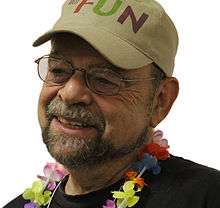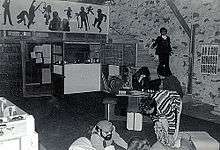Bernie De Koven
| Bernie De Koven | |
|---|---|
 | |
| Born |
Bernard Louis De Koven October 15, 1941 Appleton, Wisconsin, U.S. |
| Pen name | Major Fun, General Fun |
| Occupation | Game designer, writer, humorist, fun theorist |
| Nationality | American |
| Citizenship | United States |
| Alma mater | Villanova University |
| Period | 1967-present |
| Notable works | The Well Played Game |
| Notable awards |
1967 Rockefeller Fellowship (playwriting) 2006 Iffil-Raynolds award |
| Spouse | Rosanne "Rocky" Friedlander (m. 1966)[1] |
| Children | Shael, Elyon Avram Micah[1] |
| Website | |
|
www | |
Bernard Louis "Bernie" De Koven or DeKoven (born October 15, 1941)[1] is an American game designer, author, lecturer and fun theorist.[2] He is most notable for his book The Well Played Game, for his contributions to the New Games Foundation,[3] his pioneering work in computer game design,[4] and for his long-running web site, deepFUN.com.[5]
Career

In 1968, De Koven began work on his Interplay Curriculum for the School District of Philadelphia. The curriculum was published in 1971, and a second edition printed in 1974.[6]
In 1971, De Koven and his family established The Games Preserve, a retreat center for the study of games and play located in Eastern Pennsylvania.[5][7]
In 1975, De Koven first became involved with the New Games Foundation.[5][8]
In 1976, De Koven designed Playday on the Parkway for the city of Philadelphia - the culminating event in Philadelphia's Bicentennial celebration.[6][9]
In 1978, De Koven authored The Well-Played Game, which BYTE later called "wonderful ... a must for prospective game designers". In 1982, BYTE's reviewer called his strategy game Ricochet (coauthored with Jeff Connelly[10] and published by Automated Simulations) "easily the most original game I've seen this year ... a game-player's delight", and stated that it "expresses many of the ideals" of The Well-Played Game.[11] That year De Koven was interviewed by InfoWorld magazine concerning the future of computer gaming; he accurately predicted the advent of games using motion control similar to the Kinect, as well as app store and related game distribution systems, stating that networking "will greatly increase the availability of games. Instead of having to buy each game, users will be able to download more and more complex games as networks become more popular."[12]
Katie Salen and Eric Zimmerman, in their 2003 game design textbook Rules of Play: Game Design Fundamentals, extensively reference De Koven's The Well-Played Game.[13]
Christopher Noxon's interview of De Koven was featured in the 2006 book Rejuvenile. His role as a professional "fun coach" is emphasized, as is De Koven's involvement with the New Games Movement of the mid-1970s, and his later work with the Esalen Institute in California.[14]
De Koven has worked with major toy and game manufacturers to design and develop new products. Notably, he has partnered with LEGO on the development of their LEGO Game System.[15] Additionally, De Koven has designed award-winning games for Ideal Toy Company, Children's Television Workshop, CBS Software and Mattel Toys.[16]
In September 2011, De Koven was a keynote speaker at the 2011 Digital Games Research Association Conference ("Think Design Play"). His talk, "Playing Well Together," described some of the underlying principles of New Games and his book, The Well-Played Game.[5][17]
De Koven is a lifetime member of The Association for the Study of Play.[8][18][19]
Awards
- 2006 Ifill-Raynolds award for "outstanding achievement in the field of fun" from the North American Simulation and Gaming Association[19][20]
Books / publications
- Interplay: a curriculum for elementary school children, Office of Policy Planning and Development, School District of Philadelphia, 1971 (OCLC 9095130)
- "The Play Community" in The New Games Book, 1976 (ISBN 0-385-12516-X)
- The Well-Played Game, 1978, updated edition 2002 (ISBN 978-0595217908), MIT Press edition August, 2013 (ISBN 978-0262019170)
- Connected Executives: A Strategic Communications Plan, 1986 (ISBN 978-0962583407)
- Junkyard Sports, 2004 (ISBN 978-0736052078)
- Great Games for Big Activity Balls (with Todd Strong), 2009 (ISBN 978-0736074810)
- A Playful Path, 2013 (ISBN 978-1490333816)[21]
Games and interactive media
- Ricochet[22][23] (1981): one of the first abstract strategy games for computers[24][25][26] by Automated Simulations (designer), E. Connelley, programmer
- Alien Garden (1982): one of the first computer art games.[27][28] Released by Automated Simulations. (designer; programmed by Jaron Lanier)(Video on YouTube)
- Light Waves[29][30] (1984): computer game by Children's Computer Workshop (designer; prototype by Dave Winer)
- Junkyard Games[3] (2008) business simulation game published by HRDQ (designer; manual by Ron Roberts)
References
- 1 2 3 De Koven, Elyon. "DeKoven Family Tree". Paging the DeKoven family. Retrieved 3 October 2011.
- ↑ Wilson, Douglas. "Brutally Unfair Tactics Totally OK Now: On Self-Effacing Games and Unachievements." Game Studies. Vol.11, Iss.1. February 2011. ISSN 1604-7982
- 1 2 Pearce, Celia; Tracy Fullerton; Janine Fron; and Jacquelyn Ford Morie. "Sustainable Play: Toward A New Games Movement For The Digital Age." Games and Culture. Vol.2, No.3. Pp.261-278. July 2007. ISSN 1555-4120
- ↑ Thomsen, Michael. "Review: The Smithsonian Celebrates Video Games - America's first art museum and The Art of Video Games." IGN. 30 March 2012
- 1 2 3 4 Weldon, Laura Grace. "Bernie DeKoven: Designing Deep Fun Into Games & Other Life Necessities." Wired. 15 February 2013.
- 1 2 De Koven, Bernie; Silberman, Melvin L. ed. "Junkyard Sports: Learning Through Creative Play." The Handbook of Experiential Learning. John Wiley & Sons. 15 March 2007. ISBN 9780470117392
- ↑ http://www.deepfun.com/fun/2010/06/the-games-preserve/
- 1 2 De Koven, Bernie. "Here's Bernie." DeepFun.com. 2013.
- ↑ Albright, John Brannon. "Bell-Ringings, Fireworks, Parades Set for July 4." Lakeland Ledger. 27 July 1976.
- ↑ DeKoven, Bernie. Ricochet revealed. Deepfun.com. 3 March 2014.
- ↑ Williams, Gregg (December 1982). "Ricochet". BYTE. pp. 142–146. Retrieved 19 October 2013.
- ↑ Frieberger, Paul (April 12, 1982). "Supergames". InfoWorld. Retrieved 3 October 2011.
- ↑ Salen and Zimmerman (2004). Rules of play: game design fundamentals. MIT Press. p. 645. ISBN 978-0-262-24045-1. Retrieved 3 October 2011.
- ↑ Noxon, Christopher (2007). Rejuvenile : kickball, cartoons, cupcakes, and the reinvention of the American grown-up (1st pbk. ed.). New York: Three Rivers Press. pp. 71–72. ISBN 978-1-4000-8089-2.
- ↑ "It's Never Too Late – Confessions of a LEGO® Game Consultant". LEGO web site. The LEGO Group. Retrieved 3 October 2011.
- ↑ "Out Of The Box Publishing: Bernie De Koven Bio". Out Of The Box Publishing. Retrieved 3 October 2011.
- ↑ "Bernie DeKoven | Think Design Play". DiGRA. Retrieved 3 October 2011.
- ↑ "TASP: The Association for the Study of Play - Past Annual Conferences". Retrieved 21 September 2013.
- 1 2 De Koven, Bernie. "The Ball." International Journal of Play. Vol.1, Iss.3. Pp.332-335. 2012. ISSN 2159-4937
- ↑ Wake, Bill. "NASAGA ’06 Trip Report - Part 1." XP123.com. 13 October 2006.
- ↑ A Playful Path. ETC PRess. 2013.
- ↑ "Ricochet Archived September 27, 2013, at the Wayback Machine.." Personal Computer Museum. Retrieved 21 September 2013.
- ↑ De Koven, Bernard. "Alien Garden." DeepFun.com. 10 October 2012.
- ↑ De Koven, Bernard. Ricochet. Automated Simulations. Accessed: 8/9/2013.
- ↑ Staff. "From Automated Simulations". Compute!. Issue 21. Pg.183. February 1982.
- ↑ "Ricochet". Epyx Summer Catalog of Games. Epyx. Pg.2. 1982.
- ↑ Pratt, Charles J. The Art History... Of Games? Games As Art May Be A Lost Cause. Gamasutra. 8 February 2010.
- ↑ Staff. "The Art Of Gaming." Edge. 8 February 2010.
- ↑ "Light-Waves Archived September 27, 2013, at the Wayback Machine.". Personal Computer Museum. Retrieved 21 September 2013.
- ↑ Wiswell, Phil. "User Views: New Computer Games - Lightwaves." Enter. Issue 15 (Vol.2, No.5). P.41. March 1985.
External links
- Official website
- Works by or about Bernie De Koven in libraries (WorldCat catalog)
- Bernie De Koven on Academia.edu